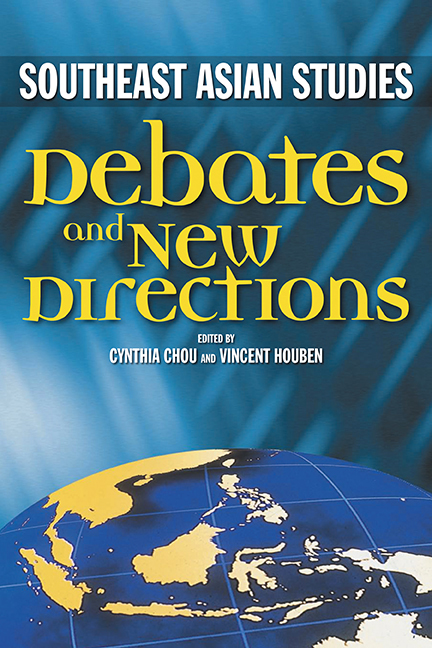Book contents
- Frontmatter
- Contents
- List of Contributors
- Preface
- 1 Introduction
- 2 Southeast Asia: Personal Reflections on a Region
- 3 Region, Academic Dynamics, and Promise of Comparitivism: Beyond Studying ‘Southeast Asia’?
- 4 Towards Multi-Laterality in Southeast Asian Studies: Perspectives from Japan
- 5 The Academic's New Clothes: The Cult of Theory versus the Cultivation of Language in Southeast Asian Studies
- 6 Rethinking Southeast Asian Politics
- 7 Reconceptualizing Southeast Asian Studies
- 8 Southeast Asian History: The Search for New Perspectives
- 9 Film, Literature, and Context in Southeast Asia: P. Ramlee, Malay Cinema, and History
- Bibliography
- Index
3 - Region, Academic Dynamics, and Promise of Comparitivism: Beyond Studying ‘Southeast Asia’?
Published online by Cambridge University Press: 21 October 2015
- Frontmatter
- Contents
- List of Contributors
- Preface
- 1 Introduction
- 2 Southeast Asia: Personal Reflections on a Region
- 3 Region, Academic Dynamics, and Promise of Comparitivism: Beyond Studying ‘Southeast Asia’?
- 4 Towards Multi-Laterality in Southeast Asian Studies: Perspectives from Japan
- 5 The Academic's New Clothes: The Cult of Theory versus the Cultivation of Language in Southeast Asian Studies
- 6 Rethinking Southeast Asian Politics
- 7 Reconceptualizing Southeast Asian Studies
- 8 Southeast Asian History: The Search for New Perspectives
- 9 Film, Literature, and Context in Southeast Asia: P. Ramlee, Malay Cinema, and History
- Bibliography
- Index
Summary
Why does Southeast Asian studies exist? Academics are very good at analysing other peoples' societies, but we have never been as competent at turning our analytical skills to the academic society we inhabit in our professional lives. Academic society is a strange world, or rather worlds, for most of us actually inhabit at least two relatively distinct worlds. On the one hand, we live in the institutional world of universities, where we deal with students, colleagues and administrators with varying degrees of effectiveness and pleasure. This is a life abundantly chronicled in novels, though it is much less subject to scholarly scrutiny. We may, if we are fortunate, have colleagues and students with whom we can develop intellectual relationships. For the most part, however, the best part of our intellectual life depends on being a part of another world, that global archipelago of scholars who in some way – difficult to define – constitute our peers and constitute the field in which we work. This is the world we inhabit briefly at conferences, and our best conversations are often those held on such occasions, as well as by e-mail and in books, book reviews and articles, with scholars from other institutions who share our interests and who challenge our assumptions.
Whatever our topics of research, we generally have a sense of belonging to a field, a collectivity of living scholars and published work which somehow seems to be engaged in the same intellectual programme. Whereas fields may be more or less defined institutionally – bureaucrats can tell us precisely, for instance, where Asia stops and the Pacific starts – intellectually they are fuzzy and volatile. In practice most of us locate ourselves within several fields. Some of them exist in a series of intellectual concentric circles based on location (Jakarta, Java, Indonesia, Southeast Asia, Asia) or time period (1870–1900, being part of the nineteenth century, and then of the modern era), whereas others are defined by topic – violence, film, environment, diasporas, entrepreneurship, and so on – or by conventional discipline.
- Type
- Chapter
- Information
- Southeast Asian StudiesDebates and New Directions, pp. 45 - 64Publisher: ISEAS–Yusof Ishak InstitutePrint publication year: 2006



